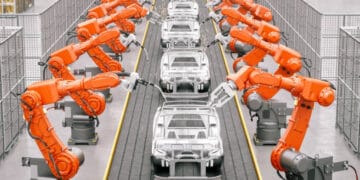In response to a myriad of challenges impacting manufacturing, the adoption of automation and robotics is gaining traction as a potential solution. With projections indicating a significant shortfall in the workforce by 2030 and various economic factors adding complexity, the imperative for UK industries to embrace automation has become increasingly evident.
ABB Robotics has identified three prominent trends that are shaping the demand for robots, underscoring the necessity for collaborative efforts between industry and educators to bridge the skills gap in robotics and automation.
Marc Segura, President of ABB Robotics, sheds light on these trends and provides insights into the UK’s position in the realm of robotics adoption.
Labor Shortages: A persistent challenge in the manufacturing sector is the shortage of skilled labor, exacerbated by demographic shifts and evolving career preferences. This scarcity of talent poses long-term implications for workforce sustainability, with projections indicating a substantial shortfall in manufacturing positions. Despite initiatives to attract talent and diversify skill sets, the industry faces an uphill battle in addressing this shortage, necessitating alternative strategies such as automation to augment labor capabilities.
Reshoring: In light of geopolitical considerations and the aftermath of the COVID-19 pandemic, there has been a notable trend towards reshoring and nearshoring among companies seeking to bolster supply chain resilience. The relocation of operations entails a shift from low-cost labor markets, necessitating investments in automation to offset higher labor costs and enhance competitiveness.
Technology Adoption: Advancements in artificial intelligence (AI) are driving transformative capabilities in robotics, particularly in areas such as autonomous mobile robots (AMRs) and manipulators. AI-powered technologies are enabling robots to navigate complex environments and perform intricate tasks autonomously, heralding a new era of automation applications. These technological innovations hold promise for unlocking new efficiencies and capabilities in manufacturing operations.
Sustainability: Amid growing emphasis on environmental sustainability, manufacturing companies are under pressure to adopt eco-friendly practices. Automation plays a crucial role in achieving sustainability objectives by optimizing energy consumption and enabling the repurposing of robotic assets. Initiatives to refurbish and extend the lifespan of robots contribute to a circular economy ethos, aligning with corporate sustainability goals.
Challenges in the UK: Despite the compelling rationale for automation adoption, the UK lags behind global peers in robotic deployment. Limited awareness, coupled with uncertainties surrounding return on investment, impedes widespread adoption of automation technologies. Addressing these challenges necessitates concerted efforts to enhance education and awareness, empowering businesses to harness the transformative potential of automation.
Looking Ahead: As manufacturing landscapes evolve and uncertainties persist, automation emerges as a critical enabler of resilience and adaptability. Flexible manufacturing paradigms, facilitated by robotics and automation, empower companies to navigate dynamic market conditions and respond effectively to disruptions. However, proactive measures are required to accelerate automation adoption and equip the workforce with the requisite skills for the digital age.
In conclusion, the trajectory of manufacturing hinges on the strategic integration of automation and robotics, offering a pathway to enhanced competitiveness, sustainability, and resilience in an increasingly complex global landscape.
Stay on top of supply chain news with The Supply Chain Report. Enhance your international trade knowledge with free tools from ADAMftd.com.
#ManufacturingAutomation #RoboticsInManufacturing #AIInRobotics #UKManufacturingChallenges #WorkforceShortage #AutomationAdoption #ReshoringTrends #SustainabilityInManufacturing #TechnologyInManufacturing #RoboticInnovation #CollaborativeEducation #FutureOfManufacturing #AutomationInIndustry #UKRobotics #SmartManufacturing #RoboticsAndAI #AutomationForSustainability #LaborShortageSolutions #RoboticsTrends #AutomationForCompetitiveness #CircularEconomy #FlexibleManufacturing #AIInAutomation #ManufacturingResilience #SmartFactories















